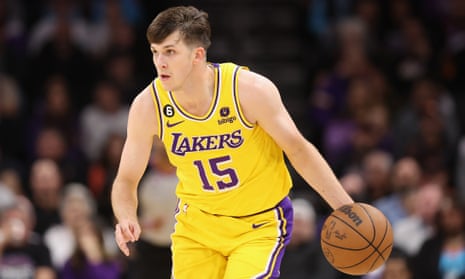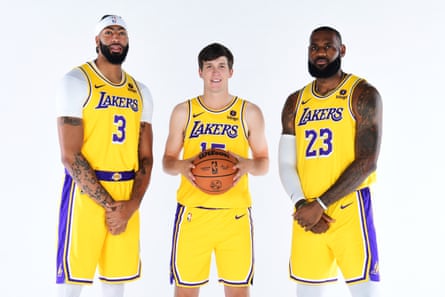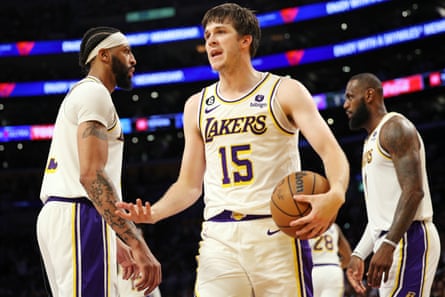AR, go win the ballgame! “Go win the game!” As he speaks to a reporter for a walk-off interview, LeBron James is shouting in Austin Reaves’ ear. It is just seconds after the Lakers’ thrilling overtime victory against the Clippers on their shared home court in Los Angeles, their first victory over their Crypto.com Arena neighbors in a dozen tries. Of course, Reaves did not secure the victory on his own. It was a genuine team effort, led by James, who established the record for most points scored by a player in their 21st season (35) by himself.
But James is reinforcing the conclusion reached by everyone in the organization (and many more in the NBA at large): Reaves is – as he exclaimed after hitting a half-court buzzer-beater against the Golden State Warriors in last year’s playoffs – him.
To say Reaves had a terrible start to the season would be an understatement. Yes, the 6ft 5in, 197lb shooting guard was still important in some ways in the Lakers’ opening few games, but his typical verve was gone, the propulsive drives to the basket resulting in opportune scores, the improbable heaves from afar swishing through the basket. It was speculated that this was due to his acclimating to his newfound spotlight, a byproduct of having essentially no offseason (due to his feature role for Team USA at the Fiba World Cup over the summer), or even simply an adjustment period to the new-look Laker lineup.
Whatever the explanation, the drop in quality has both the internet proletariat and the roundtable pros chatting at full volume. One of the unintended consequences of commanding people’s attention is that they’re constantly hunting for evidence that you don’t deserve it. Reaves is a floppy-haired, undrafted white boy from a little town in rural Arkansas; he’d look just as at home hawking orange puffer jackets at Bass Pro Shops as he would in an NBA outfit. What were the chances that he was the real deal, that his improbable rise to become the Lakers’ third best player during their run to the conference finals as the No. 10 seed last year wasn’t a fluke?
To his credit, Reaves doesn’t appear to have been rattled by the publicity surrounding his poor start. During his shooting slump, he told a reporter after the game, “You want to make shots. However, no athlete has ever played flawlessly during their entire career. So these things happen, and you just have to figure out how to deal with them.”
This is typical of the even-keeled Reaves, who, despite being hyper-competitive on the court, never seems to get too high or too low. He sheepishly laughed off persistent, odd allegations this summer that he was Taylor Swift’s paramour prior to Travis Kelce (a myth that, it turns out, was originated as a joke by a Clippers staffer). Outside the lines, his in-game intensity is belied by his aw-shucks demeanor: continuously shy to accept much acclaim, steadfast in wearing a tech fleece in his tunnel ensembles in lieu of high fashion, and hesitant to even acknowledge, truly, the growing profile he’s garnered over the past year.

I put up my phone in the Lakers’ locker room before their home opener against the Phoenix Suns to show Reaves what the Lakers had posted on Instagram ahead of the game: a shot from media day depicting the club’s presumed ‘Big Three’: LeBron James, Anthony Davis, and Reaves. I asked him what a teenage Austin would think if he saw this photograph and was informed that this will be his life eventually, growing up on the outskirts of Newark, Arkansas (population: 1,100). “I would’ve looked at you like you had six faces,” he deadpanned.
His modest demeanor has no doubt contributed to people’s reluctance to recognize his meteoric rise. However, the greatest basketball brains in his vicinity have always spotted something exceptional in him. I asked Frank Vogel, the current head coach of the Phoenix Suns, who coached Reaves during his rookie season with the Lakers, if he spotted early hints that Austin had an it-factor. “I did,” Vogel said. “We were very high on him.” He remembers Lakers scouting director Jesse Buss showing him film of Reaves’ collegiate days at Wichita State and the University of Oklahoma: “It was remarkable how well he played.” With the way he played in pick and roll, I thought he was a smaller, poor man’s Luka [Doni] – it was that stunning to me.”
Reaves dismisses accolades, claiming that his parents and brother raised him to “play the game the right way” and that he’s focused on improving his skills. “Every year, I want to compete, grow, and get better, just to see how good I can be.” That is my primary focus. You’ll never be flawless at this, and that’s what keeps you going.” He’s tried, he says, to maintain his attention on that objective rather than his growing popularity and, to be honest, strange life path thus far. “I stay very present,” he explained. “One of these days I’ll sit down and reflect more [on my career] and probably appreciate it- not that I don’t appreciate it now, but appreciate it a lot more, and in a different aspect.”
Reaves saw playing time immediately in Los Angeles, thanks in part to the Lakers’ dismal bench situation in his rookie year, though it took a little while for him to become a regular rotation player, and much longer to be elevated to the starting role he won deep into last season. As Reaves’ popularity grew, he became a fan favorite, especially when his outstanding play in the second half of the season helped propel the Lakers into the playoffs. By the end of the season, the adoration had reached such a fever pitch that he was receiving “M-V-P!” chants throughout his free throw attempts.
Of course, there’s the other side of the coin: the more people who support you, the more people who oppose you. But Reaves, who can be off-puttingly well-adjusted at times, doesn’t mind. “I care about what I care about, and that’s obviously basketball, my family,” he responded, when I asked if he ever felt misunderstood or rattled by all the strangers’ opinions. “But all the outside noise is like… great if you support me.” It doesn’t really matter to me if you don’t. It comes with it, and I think that’s the lovely thing about sports: you’re fans of who you’re fans of.” He takes a breather. “And that’s about it.” “I’m a fairly straightforward individual.”

Reaves was recently shifted to a sixth-man role in the Lakers’ rotation, a move that head coach Darvin Ham described as “not a demotion, just a realignment,” comparing it to Manu Ginóbili’s super-sub role with the Spurs’ second unit. To his credit, Reaves appears to have adjusted nicely. He has kept up his minutes and has been an impact player for the team; his points, rebounds, and assists per game numbers are all up from previous season. “Basketball is basketball for me,” he said after the Los Angeles Lakers defeated the Portland Trail Blazers on Sunday. “Start, come off the bench, go home and play pickup.” “Regardless of the situation, I try to play the same way.”
I asked Paolo Banchero of the Orlando Magic, who played alongside Reaves at this summer’s World Cup, what he finds remarkable about him. “His fearlessness,” remarked last year’s first-round choice without hesitation. “He’s not scared of any moment, really.” Banchero gave his Team USA teammate a glowing appraisal (“great guy, super humble”) and was unequivocal in his assessment of where Reaves’ career may go from here. “I think he’s on his way to being a star,” remarked Banchero. “He’s an every-game type of guy who will show up in big moments.” I’m sure he’ll make a lot of big shots for the Lakers. I believe he will have a successful career.”

But it’s not just Banchero who believes in Reaves. LeBron James, the Lakers’ senior statesman, has expressed his belief in him. In their Los Angeles locker room, James tells Reaves, “You’re a star, man.” Reaves returns his smile, shaking his head. “Ha. “Pretend until you make it.” Fakes, however, do not fool James, and the evidence is building that Reaves is not one.